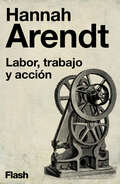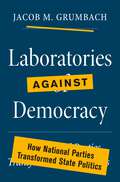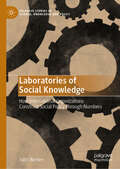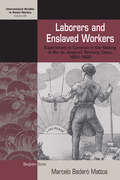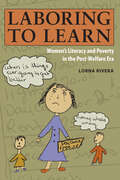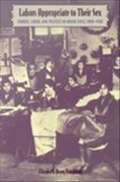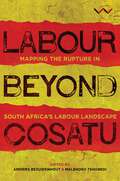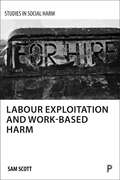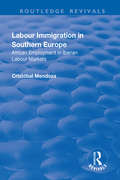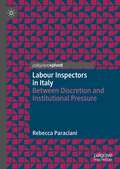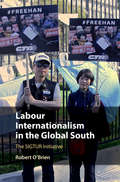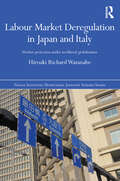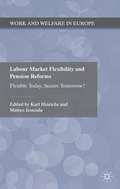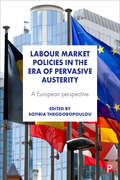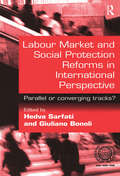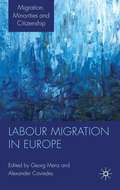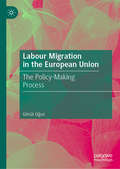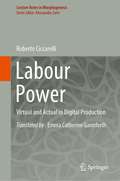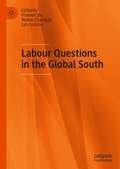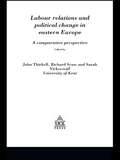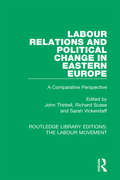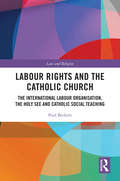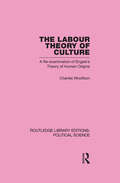- Table View
- List View
Labor, trabajo y acción
by Hannah ArendtFlash publica uno de los textos más representativos del pensamiento de Hannah Arendt. Un ensayo que reinterpreta los conceptos de labor, trabajo y acción en su relación con el ser humano a lo largo de la historia de la humanidad. «Es el momento de aprovechar esta oportunidad para pensar en lo que es un trabajo valioso de verdad». Enrique Zamorano, El Confidencial En este texto, recogido en La pluralidad del mundo, Hannah Arendt reflexiona sobre el significado del trabajo y su relación con el ser humano a lo largo del tiempo. La filósofa toma como base el concepto de vida activa y cómo en esta se desarrollan los tres medios (labor, trabajo y acción) con los que alcanzar el «ideal» al que los griegos aspiraban desde la era pre-filosófica: una vida contemplativa, aquella que les podría otorgar calma, paz interior y claridad de pensamiento. No obstante, Arendt da un paso más allá y trata de desmontar esa jerarquía donde prevaleció durante siglos la contemplación y la calma. ¿Y si la vida activa fuera inherente al ser humano? ¿Y si estamos predestinados a la actividad para mantenernos vivos? ¿No deberíamos resignificar nuestros valores? Con estas preguntas, Arendt examina los tres conceptos que ponen en el centro al ser humano y su relación con el entorno: la labor, como una actividad rutinaria y necesaria para la supervivencia del individuo; el trabajo, como el esfuerzo que produce un mundo con objetos sólidos y perdurables, que sobreviven a la finitud de los organismos vivos; la acción, intrínseca a los seres humanos desde que nacemos, porque estamos condenados a relacionarnos y nuestros actos tienen causas y consecuencias infinitas. A través del estudio y la separación de estas tres ideas, Arendt pone en valor la vida activa para comprender que no se puede prescindir de ella en pro de la contemplación, puesto que reivindicar la labor, el trabajo y la acción es reivindicar nuestra propia libertad como individuos en el mundo. Sobre La pluralidad del mundo: «Hoy, como entonces, el vocabulario que empleó Arendt para pensar y narrar el mundo, sus reflexiones y esa escritura tan bella, tan suya, nos ayudan a interpretar lo que nos ocurre, aunque solo sea como simples enanos mirando el mundo a hombros de gigantes. Ella, desde luego, lo fue.»Máriam Martínez-Bascuñán, Babelia, El País «Hannah Arendt volvió a pensar el espacio público después de su destrucción y nosotros debemos volver a ella para prevenir que se destruya de nuevo.»Andreu Jaume «Judía y alemana, Hannah Arendt reflexiona sobre la ascensión del nazismo y la ceguera de no haber visto a tiempo su peligro.»César Antonio Molina, ABC Sobre La libertad de ser libres: «Este ensayo recién redescubierto es como una petición de compromiso político en la era de Trump.»Die Zeit «Pese a haber sido escrito hace cincuenta años, es tan moderno que parece pensado para la actualidad política mundial.»Westdeutscher Rundfunk «Un ensayo inspirador de una relevancia extraordinaria, especialmente en tiempos en que se cuestionan los valores liberales del orden democrático.»Philosophie Sobre Eichmann en Jerusalén: «Es historia, es pensamiento y es advertencia -aún hoy- sobre las consecuencias de la banalidad del mal, de la que a pesar de lo vivido, no estamos vacunados.»Laura Barrachina, RNE «Un ensayo imprescindible. Arendt no se olvida de nadie.»Marta Michel, El Mundo - Yo Dona «En vez de defender la causa de su pueblo de manera incondicional, Arendt se puso a reflexionar, investigar y debatir. En palabras de Aristóte
Laboratories against Democracy: How National Parties Transformed State Politics (Princeton Studies in American Politics: Historical, International, and Comparative Perspectives #184)
by Jacob GrumbachAs national political fights are waged at the state level, democracy itself pays the priceOver the past generation, the Democratic and Republican parties have each become nationally coordinated political teams. American political institutions, on the other hand, remain highly decentralized. Laboratories against Democracy shows how national political conflicts are increasingly flowing through the subnational institutions of state politics—with profound consequences for public policy and American democracy.Jacob Grumbach argues that as Congress has become more gridlocked, national partisan and activist groups have shifted their sights to the state level, nationalizing state politics in the process and transforming state governments into the engines of American policymaking. He shows how this has had the ironic consequence of making policy more varied across the states as red and blue party coalitions implement increasingly distinct agendas in areas like health care, reproductive rights, and climate change. The consequences don’t stop there, however. Drawing on a wealth of new data on state policy, public opinion, money in politics, and democratic performance, Grumbach traces how national groups are using state governmental authority to suppress the vote, gerrymander districts, and erode the very foundations of democracy itself.Required reading for this precarious moment in our politics, Laboratories against Democracy reveals how the pursuit of national partisan agendas at the state level has intensified the challenges facing American democracy, and asks whether today’s state governments are mitigating the political crises of our time—or accelerating them.
Laboratories of Social Knowledge: How International Organizations Construct Social Policy Through Numbers (Palgrave Studies in Science, Knowledge and Policy)
by John BertenThe book examines the politics of knowledge in global social policy, investigating how international organisations (IOs) have contributed to the emergence and development of social security as a global policy field. It reconstructs the role of numerical knowledge in the International Labour Organization (ILO) and the World Bank, theorising how IOs contribute to epistemic infrastructures of global social security. The book shows how IOs&’ knowledge production has led to a continuous refinement of the meaning and purpose of social security. First, it reveals how IOs arrived at a shared conception of social security: what the book calls an ontological framework. Second, it traces how numbers have increasingly enabled the assessment of countries according to shared benchmarks: what the book calls an evaluative framework. The author demonstrates the political and epistemic work involved in universalising knowledge of social security, while highlighting the limits of governing by numbers in global social policy.
Laborers and Enslaved Workers: Experiences in Common in the Making of Rio de Janeiro's Working Class, 1850-1920
by Marcelo Badaró MattosFrom the middle of the nineteenth century until the 1888 abolition of slavery in Brazil, Rio de Janeiro was home to the largest urban population of enslaved workers anywhere in the Americas. It was also the site of an incipient working-class consciousness that expressed itself across seemingly distinct social categories. In this volume, Marcelo Badaró Mattos demonstrates that these two historical phenomena cannot be understood in isolation. Drawing on a wide range of historical sources, Badaró Mattos reveals the diverse labor arrangements and associative life of Rio's working class, from which emerged the many strategies that workers both free and unfree pursued in their struggles against oppression.
Laboring to Learn: Women's Literacy and Poverty in the Post-Welfare Era
by Lorna RiveraThe American adult education system has become an alternative for school dropouts, with some state welfare policies requiring teen mothers and women without high school diplomas to participate in adult education programs to receive aid. Currently, low-income women of color are more likely to be enrolled in the lowest levels of adult basic education. Very little has been published about women's experiences in these mandatory programs and whether the programs reproduce the conditions that forced women to drop out in the first place. Lorna Rivera bridges the gap with this important study, the product of ten years' active ethnographic research with formerly homeless women who participated in adult literacy education classes before and after welfare reform. She draws on rich interviews with organizers and participants in the Adult Learners Program at Project Hope, a women's shelter and community development organization in Boston's Dudley neighborhood, one of the poorest in the city. Analyzing the web of ideological contradictions regarding "work first" welfare reform policies, Rivera argues that poverty is produced and reproduced when women with low literacy skills are pushed into welfare-to-work programs and denied education. She examines how various discourses about individual choice and self-sufficiency shape the purposes of literacy, how low-income women express a sense of personal responsibility for being poor, and how neoliberal ideologies and practices compromise the goals of critical literacy programs. Throughout this study, the voices and experiences of formerly homeless women challenge cultural stereotypes about poor women, showing in personal and structural terms how social and economic forces shape and restrict opportunities for low-income women of color.
Labors Appropriate to Their Sex: Gender, Labor, and Politics in Urban Chile, 1900-1930
by Elizabeth Quay HutchisonIn Labors Appropriate to Their Sex Elizabeth Quay Hutchison addresses the plight of working women in early twentieth-century Chile, when the growth of urban manufacturing was transforming the contours of women's wage work and stimulating significant public debate, new legislation, educational reform, and social movements directed at women workers. Challenging earlier interpretations of women's economic role in Chile's industrial growth, which took at face value census figures showing a dramatic decline in women's industrial work after 1907, Hutchison shows how the spread of industrial sweatshops and changing definitions of employment in the census combined to make female labor disappear from census records at the same time that it was in fact burgeoning in urban areas. In addition to population and industrial censuses, Hutchison culls published and archival sources to illuminate such misconceptions and to reveal how women's paid labor became a locus of anxiety for a society confronting social problems--both real and imagined--that were linked to industrialization and modernization. The limited options of working women were viewed by politicians, elite women, industrialists, and labor organizers as indicative of a society in crisis, she claims, yet their struggles were also viewed as the potential springboard for reform. Labors Appropriate to Their Sex thus demonstrates how changing norms concerning gender and work were central factors in conditioning the behavior of both male and female workers, relations between capital and labor, and political change and reform in Chile. This study will be rewarding for those whose interests lie in labor, gender, or Latin American studies; as well as for those concerned with the histories of early feminism, working-class women, and sexual discrimination in Latin America.
Labour Beyond Cosatu: Mapping the rupture in South Africa’s labour landscape
by ANDRIES BEZUIDENHOUT & MALEHOKO TSHOAEDILabour Beyond Cosatu is the fourth volume in the series Taking Democracy Seriously – a ground-breaking, textured and nuanced study on workers and democracy – which was established in the 1990s. The series looks at members of trade unions affiliated to the Congress of South African Trade Unions (Cosatu) and provides a rich database of trade union members and research conducted over the past twenty years. It is one of the very few such resources available to researchers anywhere in the world. Labour Beyond Cosatu paints a complex picture. The 12 chapters of the volume explore various rebellions and conflicts in the trade union sector, starting with the National Union of Mineworkers (NUM) and rivalries between Cosatu affiliates. Unpacking the conflicts between state-sector and private-sector workers, contributors look at the impact of generational and educational shifts, seen by some commentators as proof that Cosatu is now ‘middle class’. The book also raises the issue of gender in the unions by usefully locating the controversy around charges levelled at Zwelinzima Vavi in 2013 in the larger context of serious problems in the gender politics within parts of Cosatu.Refuting the image of a union federation solidly committed to the ANC, Labour Beyond Cosatu presents evidence of a sharp decline in support for the ANC within Cosatu, and growing scepticism towards the Alliance. It shows that attempts to understand the labour movement in South Africa in the future will need to include research of smaller, independent unions and social movements. The volume’s contributors make a major contribution to key debates on labour and democracy, providing new material that can potentially shift the discussion in important ways. This book will be of great value to students and researchers in Industrial Sociology, Political Studies, Industrial Psychology and Economics and Management.
Labour Exploitation and Work-Based Harm (Studies in Social Harm)
by Sam ScottEPUB and EPDF available Open Access under CC-BY-NC-ND licence. Labour exploitation is a highly topical though complex issue that has international resonance for those concerned with social justice and social welfare, but there is a lack of research available about it. This book, part of the Studies in Social Harm series, is the first to look at labour exploitation from a social harm perspective, arguing that, as a global social problem, it should be located within the broader study of work-based harm. Written by an expert in policy orientated research, he critiques existing approaches to the study of workplace exploitation, abuse and forced labour. Mapping out a new sub-discipline, this innovative book aims to shift power from employers to workers to reduce levels of labour exploitation and work-based harm. It is relevant to academics from many fields as well as legislators, policy makers, politicians, employers, union officials, activists and consumers.
Labour Immigration in Southern Europe: African Employment in Iberian Labour Markets (Routledge Revivals Ser.)
by Cristobal MendozaThis title was first published in 2003. Research on migration into southern Europe has paid little consideration to the ways of incorporating immigrants into labour markets and the impact these foreign-born workers have on local labour markets. Neither has much attention been given to the character of labour markets that enables these workers to find a job. This book fills that gap by exploring case studies of African employment in Spain and Portugal. Using cross-border perspectives, this book provides in-depth analysis of common trends across borders, such as immigrant employment in manual, low-skilled jobs, uneven immigrant involvement in labour markets, and the impact of national characteristics, economies and political environments. The result is a study which should be useful for migration specialists, economic geographers and labour market analysts alike.
Labour Inspectors in Italy: Between Discretion and Institutional Pressure
by Rebecca ParacianiThis book analyses labour inspectors’ discretionary practices in handling complex cases of labour exploitation in the Italian context. By outlining three years of field research, the volume uses the theoretical framework of street-level bureaucracy in the Italian context and integrates it with a neo-institutionalist perspective, focusing on the isomorphic pressures from the institutional field in which the labour inspectors operate. The book will be of use to advanced undergraduate students and scholars in the fields of sociology, organization studies, law and criminology, political science and public administration.
Labour Internationalism in the Global South: The SIGTUR Initiative
by Robert O'BrienLabour internationalism is often viewed as impossible or inevitable, depending upon political perspective. O'Brien argues for a more nuanced, diverse understanding of labour internationalism, identifying six different 'faces', shaped by the national or global orientation of particular groups in the fields of production, regulation and ideas. Providing a general view of labour's global activity and a case study of the Southern Initiative on Globalisation and Trade Union Rights (SIGTUR), the book illustrates how the productive and regulatory structures of the global economy are pushing labour internationalism in particular directions. It details how leftist unions in Argentina, Australia, Brazil, India, the Philippines, South Africa, and South Korea have tried to bridge their differences and launch collective actions. Drawing upon twenty years of participant observation, O'Brien reveals a specific Global South approach based upon anti-imperialism, anti-capitalism and empathetic internationalism.
Labour Law 1: For All Universities
by P. Jaganathan Usha Jaganathan J. P. Arjun A. KavithaThe document Labour Law 1 provides a comprehensive overview of significant labour laws and industrial relations in India. It covers essential acts such as the Trade Unions Act, 1926, and the Industrial Disputes Act, 1947, among others. The text outlines the historical evolution of labour relations, from the master-servant system to modern employer-employee dynamics. Theories like Laissez-Faire and social welfare are discussed in the context of industrial jurisprudence, highlighting the importance of collective bargaining and workers' rights. Additionally, it emphasizes the role of the International Labour Organization (ILO) and legislative reforms in ensuring fair wages, worker safety, and social security. The document serves as a valuable resource for law students and legal professionals studying industrial and labour laws.
Labour Market Deregulation in Japan and Italy: Worker Protection under Neoliberal Globalisation (Nissan Institute/Routledge Japanese Studies)
by Hiroaki Richard WatanabeJapan and Italy encountered severe economic problems in the early 1990s, and the governments had to deal with those issues effectively under the increasing neoliberal pressures of globalisation. In this context, labour market deregulation was considered an effective tool to cope with those economic problems. However, the forms and degrees of labour market deregulation in the two countries were quite different. This book seeks to explain the differences in labour market deregulation policies between Japan and Italy, despite the fact that the two countries shared a number of similar political, social and labour market (if not cultural) characteristics. Uniquely, it takes a political, rather than economic or sociological perspective to provide a theoretical and empirical analysis of the processes of labour market deregulation in the two countries. The precarious working conditions of an increasing number of non-regular workers has become a prominent social issue in many industrialised countries including Japan and Italy, but the level of the protection for these workers depends on a country’s labour market policies, which are affected by the power resources of labour unions and labour policy-making structures. This book provides a useful perspective for understanding the root causes of this phenomenon, such as the diffusion of ‘neoliberal’ ideas aimed at promoting labour-market flexibility under globalisation, and demonstrates that there is still room for politics to decide the extent of deregulation and maintain worker protection from management offensives even in an era of globalisation. Labour Market Deregulation in Japan and Italy: Worker Protection under Neoliberal Globalisation will appeal to students and scholars of Japanese politics, Italian politics, political economy and comparative politics.
Labour Market Flexibility and Pension Reforms
by Karl Hinrichs Matteo JessoulaIncreasingly flexible labour markets and reforms of old-age pension systems are still ranking high on the political agenda of European countries. This volume investigates whether, and to what extent, the interplay between pension reforms and the spread of 'atypical' employment patterns and fragmented careers has a negative influence uponeconomic security in old age. The volume, therefore, analyzes the flexibility-security nexus by focusing on the post-retirement phase, thus extending the conventional narrow concept of 'flexicurity'. The book also questions whetherreforms of public and private pension schemes compensate or aggravate the risks of increasingly flexible labor markets and atypical employment careers after retirement? Around this overarching research question, the various contributions in the volume employ the same analytical framework in order to map, and then compare, the developments in seven European countries - Denmark, Germany, Italy, the Netherlands, Poland, Switzerland, and the UK which present different labour market arrangements and various degrees of flexibility, as well as diverse pension systems.
Labour Market Policies in the Era of Pervasive Austerity: A European Perspective
by Sotiria TheodoropoulouThis book investigates the changing patterns of labour market and unemployment policies in EU member states during the period since fiscal austerity took hold in 2010 during the deepest postwar recession in Europe. Looking at the big European picture, do we see a convergence or a divergence in labour market and unemployment policy trends and outputs? Has labour market insecurity increased or decreased and can these changes be associated with the observed changes in labour market policies and macroeconomic conditions? Written by leading experts in the field, the book provides detailed national case studies from across the EU, which span labour market regimes and intensities of fiscal pressures to explore whether, and if so how, retrenchment or expansion have taken place across different types of labour market policies and how these changes have been distributed across the well-protected and the less well-protected labour market populations.
Labour Market and Social Protection Reforms in International Perspective: Parallel or Converging Tracks?
by Giuliano BonoliSocial protection systems and labour markets have undergone major changes in the past two decades. Welfare states are being reformed, scaled back and modernised; labour markets, at the same time, are more precarious, more feminised, more unequal, and throughout the OECD area, older. The interaction between labour markets and social protection has become increasingly crucial to the social and economic policy mix concerning unemployment, the transformation of work, the new poverty, and even demographics. Against this background, an interdisciplinary team of leading labour market and social protection experts from various OECD countries examine the multifaceted aspects of the changing relationship between social protection systems and labour markets. They identify and analyse key emerging issues, such as the link between employment and social protection financing, the adaptation of social protection systems to women's career patterns, and the development of new forms of social protection that aim at promoting employment. With practical policy guides and recommendations using case studies and comparative chapters, this will be engaging reading for policy-makers, social actors and academics alike.
Labour Migration and Social Development in Contemporary China (Comparative Development and Policy in Asia)
by Rachel MurphySince the mid-1980s, mass migration from the countryside to urban areas has been one of the most dramatic and noticeable changes in China. Labour migration has not only exerted a profound impact on China’s economy; it has also had far-reaching consequences for its social development. This book examines labour migration in China, focusing on the social dimensions of this phenomenon, as well as on the economic aspects of the migration and development relationship. It provides in-depth coverage of pertinent topics which include the role of labour migration in poverty alleviation; the social costs of remittance and regional, gender and generational inequalities in their distribution; hukou reform and the inclusion of migrants in urban social security and medical insurance systems; the provision of schools for migrants’ children; the provision of sexual health services to migrants; the housing conditions of migrants; the mobilization of women workers’ social networks to improve labour protection; and the role of NGOs in providing social services for migrants. Throughout, it pays particular attention to policy implications, including the impact of the recent policy shift of the Chinese government, which has made social issues more central to national development policies, and has initiated policy reforms pertaining to migration.
Labour Migration in Europe
by Georg Menz Alexander CaviedesExamining the new realities of economic immigration to Europe, this book focuses on new trends and developments, including the rediscovery of economic migration, legalization measures, irregular migration, East-West flows, the role of business and employer associations, new positions amongst trade unions, and service sector liberalization.
Labour Migration in the European Union: The Policy-Making Process
by Gönül OğuzNo analysis of migration in Europe today can avoid consideration of the role of the EU institutions, as well as the member states, in policy-making. This is because the obstacles for labour mobility which have confronted the EU in the post-enlargement period have been multi-dimensional in nature, have encompassed many different aspects of European integration process, and have operated at many different levels. Recent developments in the free movement of labour in Europe entail a comprehensive analysis of the dynamic of migration policy process, contextualising institutional change, cooperation, control and competition between the EU institutions and the member states. This book provides a picture of how governance of labour migration is constructed, managed, negotiated and decided at the European level. It brings together in an informed and well-organized way some of the key issues in the face of current migration crises and Brexit.
Labour Power: Virtual and Actual in Digital Production (Lecture Notes in Morphogenesis)
by Roberto CiccarelliThis book offers a critical account of Karl Marx’s dazzling theory of labour power which is also one of the most influential concepts in the history of contemporary philosophy. Labour power is the dark side of the digital revolution. Working men and women are invisible and treated like human service, flesh and blood automatons or organic extensions of a machine that produces data on its own. Automation is viewed as something magic made possible by algorithms whose life is independent of human beings.Labour power, however, has not disappeared. Without drivers, Uber cannot connect customers on its platform; without searches on its browser, Google grinds to a halt; without us, Facebook or Instagram is desert. Labour power is the dwarf hidden inside the puppet of technology that allows algorithms to be intelligent and make the biggest profits in the history of capitalism.The invisible centrality of labour power is the political enigma of our times. Today a new account of the theory of labour power is needed more than ever in order to understand the political economy of digital capitalism on new grounds. Unlike a long tradition in the history of work, labour power is not only the work or the data it produces, but a potency that does not coincide with its current commodification. The actuality of labour power does not exhaust the virtuality that can be actualised by its faculty. Even when reduced to a commodity, labour power does not exhaust the potency of its being otherwise.Immersed in the constant propaganda that boosts the latest technological inventions, we neglect the fact that this wealth is produced by us and that it could be ours precisely because it is a part of our potential to be other than what we are at present. This book is a vibrant invitation to consider the fact that we are always connected with the potency that is constantly at work in our life. If this were not the case, we would not be alive. If we do not strive to become consciously and collectively active, we will never know.
Labour Questions in the Global South
by Praveen Jha Walter Chambati Lyn OssomeThis book provides a focus on some of the main markers and challenges that are at the core of the study of structural transformations in contemporary capitalism and their implications for labour in the Global South. It examines the diverse perspectives and regional and social variations that characterise labour relations as a result of the uneven development which is an important facet of the intensification of capitalist accumulation.. The book provides important insights into the impact of the crises of capitalism on the wellbeing of labour at different historical junctures. Some of the issues covered by it include the conditions of work, and the changing composition of laboring classes and/or working people. The chapters also throw light on the multiple trajectories in the development of labour relations and employment in the Global South, especially after the ascendancy and domination of neoliberal finance capitalism. Some of the major aspects considered by the essays include the decentering of production and development of global value systems, crisis of social reproduction, and the rising informalisation of work.
Labour Relations In Eastern Europe: A Comparative Perspective (Routledge Library Editions: The Labour Movement Ser. #39)
by Sarah Vickerstaff Richard Scase John ThirkellThis book offers an insight into the process of transition in Eastern Europe. It provides a comparative analysis of trends in labour relations with and between countries, incorporating country studies which share a common theoretical and empirical framework. The book is intended for postgraduate and professional researchers and for library markets in the fields of industrial relations, sociology of industry/organizations/work, social structure, and politics. Its comparative framework also makes it useful for European studies.
Labour Relations and Political Change in Eastern Europe: A Comparative Perspective (Routledge Library Editions: The Labour Movement #39)
by Stephen G. JonesFirst published in 1995. This volume offers a comparative perspective on labour relations and political change in eastern Europe within a common theoretical and empirical framework. Its coverage includes Bulgaria, and Czech and Slovak republics, Hungary, Poland, and Russia. Particular attention is given to the dynamics of changes in labour relations and privatisation, which are now critical to the more general process of political and economic transformation. This title will be of interest to scholars and students of politics, sociology and modern history.
Labour Rights and the Catholic Church: The International Labour Organisation, the Holy See and Catholic Social Teaching (Law and Religion)
by Paul BeckettThis book explores the extent of parallelism and cross-influence between Catholic Social Teaching and the work of the world’s oldest human rights institution, the International Labour Organisation (ILO). Sometimes there is a mutual attraction between seeming opposites who in fact share a common goal. This book is about just such an attraction between a secular organisation born of the political desire for peace and justice, and a metaphysical institution much older founded to bring peace and justice on earth. It examines the principles evident in the teachings of the Catholic Church and in the secular philosophy of the ILO; together with the theological basis of the relevant provisions of Catholic Social Teaching and of the socio-political origins and basis of the ILO. The spectrum of labour rights covered in the book extends from the right to press for rights, i.e., collective bargaining, to rights themselves – conditions in work – and on to post-employment rights in the form of social security and pensions. The extent of the parallelism and cross-influence is reviewed from the issue of the Papal Encyclical of Pope Leo XIII Rerum Novarum (1891) and from the founding of the ILO in 1919. This book is intended to appeal to lay, professional and academic alike, and will be of interest to researchers and academics working in the areas of international human rights, theology, comparative philosophy, history and social and political studies. On 4 January 2021 it was granted an Imprimatur by the Roman Catholic Archbishop of Liverpool, Malcolm P. McMahon O.P., meaning that the Catholic Church is satisfied that the book is free of doctrinal or moral error.
Labour Theory of Culture: A Re-examination Of Engels' Theory Of Human Origins (Routledge Library Editions: Political Science #42)
by Charles WoolfsonDespite its importance in understanding the social relations of labour little attention has been paid by Western Marxists to evolutionary theory. Taking as a starting point an unfinished essay by Engels, the author argues that the human species must be seen as discontinuous with its nearest biological ancestors – that a qualitative distinction was brought about by social labour. It is argued that the most likely forms of human organization were co-operative and field studies are discussed which apparently provide evidence for tool use and linguistic ability among the higher primates. The relationship between hand and brain in terms of Marxist psychology is also elaborated.
